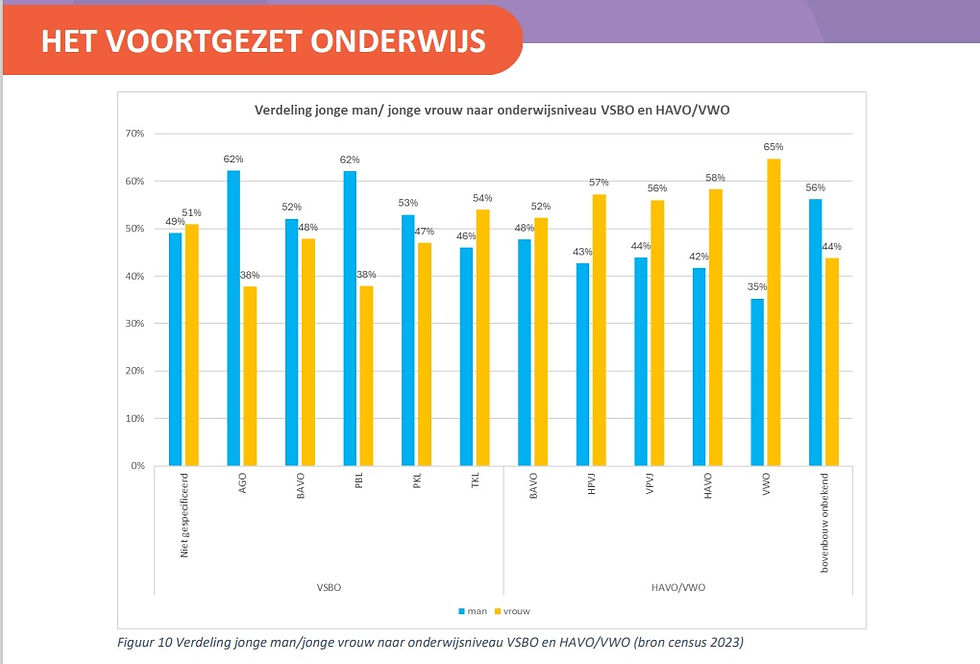Mundu No Ta Pareu II
- Robyn Fidanque
- Jul 29, 2024
- 4 min read
Updated: Aug 7, 2024
In part one of 'Mundu No Ta Pareu,' I shared my thoughts on the local CBS report that highlighted the higher number of boys in special education in Curaçao compared to girls. As promised, in this part, I will continue with two other noteworthy facts from this study.
After primary school, slightly more girls tend to go to HAVO/VWO, while more boys go to VSBO. The differences become more pronounced after the ‘basisvorming’ years. More boys than girls attend VSBO PBL (62%), while the proportion of girls increases at VSBO TKL. At HAVO/VWO, the differences grow over time, peaking at VWO, where 65% of the students are girls. The report suggests this pattern indicates that boys are more inclined toward practical levels and girls toward theoretical ones.

Source: CBS, 2024
If it were as simple as the report states—that the pattern indicates boys are more inclined toward practical levels and girls toward theoretical ones—then this discrepancy wouldn’t necessarily be a problem, right? It may be due to inherent biological differences between boys and girls (and yes, as mentioned in part one, individual differences are also normal)...
The problem is that there is an idea deeply ingrained in our culture that HAVO/VWO is better than VSBO! Some might think it's audacious for me to say this out loud, because we are doing our best to educate each other (mainly through the social media police) that all educational paths should be equally celebrated.

Even though I know most parents mean well when they say that it does not really matter if their child goes to VSBO, the amount of money spent on extra lessons and the crippling anxiety that some of these kids have due to pressure to go to and remain in HAVO/VWO tell a different story.
And believe me, I know it's secretly a dilemma; there are differences in school-environments, opportunities for entry into further education, and differences in starting salaries afterward. We as a society also tend to idolize careers that require mostly academic education over vocational. You know how many times I've heard 'Ami ke bira dòkter, abogado òf accountant!', and when I ask what do accountants do I hear 'algu ku hopi number...'.
At the end of the day, we all want what is best for our children, and that means the best chance of making a good (read financial) life for themselves, even if that means some sacrifices, right?...
"Love your children enough to let them walk their true paths. Trust in their ability to find their way and your ability to support them through obstacles."-Robyn
But, okay... Let’s go back to the numbers. Are there also more girls than boys in VWO in the Netherlands? The answer is... yes! Since the 1995-1996 school year, more girls have completed VWO than boys (NL Times, 2023). So what we are seeing is not unique to Curaçao. ChatGPT told me that this trend is also seen in the rest of Europe, although not necessarily worldwide. Interesting... 🤔
The way VWO is set up, you not only need to have the cognitive (IQ) ability to follow it, but even more important are your study habits, attitude, and perseverance. A study finds that in girls, these qualities are better developed than in boys. Girls are also more likely to complete homework, participate in class, and maintain positive relationships with teachers (Driessen & van Langen, 2013).
I think this probably has something to do with differences in general learning styles between boys and girls. Boys are typically more active learners, requiring physical engagement, whereas girls are more reflective, benefiting from structured, teacher-led environments. Some theories also suggest girls thrive in cooperative settings, while boys excel in competitive or hands-on activities. These are generalizations, of course. But, taking these factors into account, I can see how the VWO system operates more in favor of girls than boys.
I hope that there will be more research to assess our local situation. And if necessary, with mindful adaptations, we can provide equal academic opportunities for both genders. And if there is still a difference in gender, so be it.
The last piece of information I wanted to highlight from the CBS report is the specialization choices of students ('profielkeuze' of 'sectorkeuze'). In the third year of VSBO, students choose a sector to specialize in. The report notes 'gender-stereotypical choices,' with boys favoring 'technology' and girls choosing 'care and welfare.' A similar pattern is seen in HAVO/VWO, where a clear majority of girls are in ‘culture and society’ and ‘nature and health,’ while boys more often choose ‘nature and technology.’ This gender preference also extends to SBO and HBO/WO, where more men choose ‘technology’ or ‘informatics,’ and more women choose ‘healthcare and welfare.’


Source: CBS, 2024
'Gender stereotypical choices' refer to preferences, behaviors, or decisions that align with the traditional or societal expectations and norms associated with one's gender.
What do you think is the main reason for the gender differences in specialization choices in VSBO, HAVO & VWO?
1. Gender norms/stereotypes
2. Personal interests
3. Influence from parents and teachers
4. Peer influence
Nl Times, 2023: More women than men in higher education for decades, but still more men in top jobs.
Driessen & van Langen, 2013: Gender differences in primary and secondary education: Are girls really outperforming boys?

Comments